|
Laurentiu Ginghina is, in many respects, an ordinary man. Approaching middle-age and unremarkable in appearance, his dream was to study forestry at university, a dream that was shattered when a serious injury to his leg – incurred whilst playing football – made it impossible for him to complete the 3,000 metre run that was part of the entrance exam. I would hope that particular educational establishment has since updated its suspect disability policy. Laurentiu instead found work as a counsellor at the Vaslui County Prefecture in Western Moldavia. But Laurentiu has since developed a passion, one that appears to have consumed him to the point of near-obsession. It turns out that he doesn't blame the player and his misdirected kick for causing his injury, but the rules by which the game itself is played, rules he has spent many years devising major revisions to that he hopes will eventually be officially adopted.
This may not sound like much of a basis for a feature-length documentary, and on the surface at least, it probably isn't. Content-wise, Infinite Football consists of five on-screen conversations between Laurentiu and director Corneliu Porumboiu, a sixth whose audio is accompanied by slow-moving shots of empty roadways, one between Porumboiu and Laurentiu's father, and an indoor football match in which Laurentiu's new rules for play are put to the test. Much of what we learn about Laurentiu is inferred by what he says rather than being openly stated, the film itself has little in the way of narrative progression, and visually it's not the most exciting game in town. So what is it about Infinite Football that quietly hooked me and held so effectively held my interest, and why can't I get the damn thing out of my head?
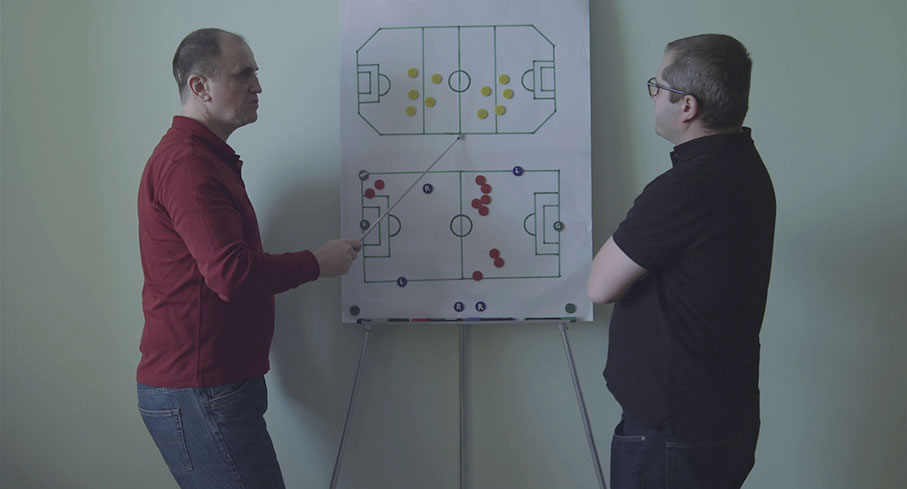
In some ways, Infinite Football harks back to the early days of Direct Cinema, when pioneering documentary filmmakers, freed from their tripods with new lightweight cameras and tape recorders, would identify a person or group of people of potential interest, then follow them with a camera over a matter of weeks or even months in the hope of fashioning the footage into a story at the editing stage. I discovered in the special features that Porumboiu had known Laurentiu for some years before deciding to make a film about him, having become aware of his obsession with the rules of football some years earlier through his friendship with Laurentiu's brother. What ultimately attracted Porumboiu to the project was the very thing that makes Infinite Football more than just a portrait of a quirky obsessive. Interesting through the surface detail most definitely is, it's the aspects of Romanian socio-political history that he saw reflected in Laurentiu's passion project that interested Porumboiu. I'll admit to being unaware of this when I sat down to watch the film, but as it progressed, it's an element that I found myself increasingly aware of and intrigued by. Even as I type that I'm aware that this leaves me open to accusations that this particular emperor's clothing is visible only to pretentious film nerds like me. Hell, what do I know? Maybe that's true. In my defence I should point out that I was hooked by the film before these allegorical elements hit me, as Laurentiu tells Porumboiu the story of how his leg was broken, how it set unevenly and how he broke it again, and just why he believes the rules of this long-established and internationally popular sport need to be changed.
It might be worth mentioning here that I have no particular bias when it come to this subject matter and no particular interest in football or its status quo. I played it at school, my late father was a fourth division footballer in his younger days, and my grandfather was for some time the team coach, but as I left my teenage years behind me I lost interest in sport of any kind. I'm not remotely competitive, and if you play me at just about anything I'll happily let you win if that's important to you, because it's not to me. Yet for better or for worse, football is part of many countries' national identity, my own included, so it has continued to figure in my life in various ways over the years. This includes being the subject around which some fascinating films have been made, from Gordon Douglas and Philippe Parreno's observational documentary, Zidane, a 21st Century Portrait, to Jafar Janahi's superb political drama, Offside – only after I'd plucked these titles from memory and committed them to text did I realise that both were released in 2006. There must have been something in the air that year.
It's perhaps that ingrained knowledge of the game and how it is played that I became too quickly convinced that the rules that Laurentiu had devised, repeatedly revised and is still constantly updating, would do little if anything to improve the sport. Indeed, most of what he proposes would over-complicate a game whose rules are for the most part relatively simple to grasp, and as Porumboiu cannily points out at one point, Laurentiu fails to take on board the negative impact these changes would likely have on football as a spectator sport. It's because of this, and his unwavering belief in his quest, that the likeable Laurentiu does occasionally come across as a little delusional, as someone banging away at an obsession that I began to suspect was born of a grudge against a game that he believes robbed him of his dream of going to forestry university. This conviction of the importance of his work is at its most evident when he draws an admittedly light-heated parallel between himself and the likes of Superman and Spider Man, who, in their guises as Clark Kent and Peter Parker, are ordinary folk with humdrum day jobs, but are secretly superheroes on a quest to put the world to rights.
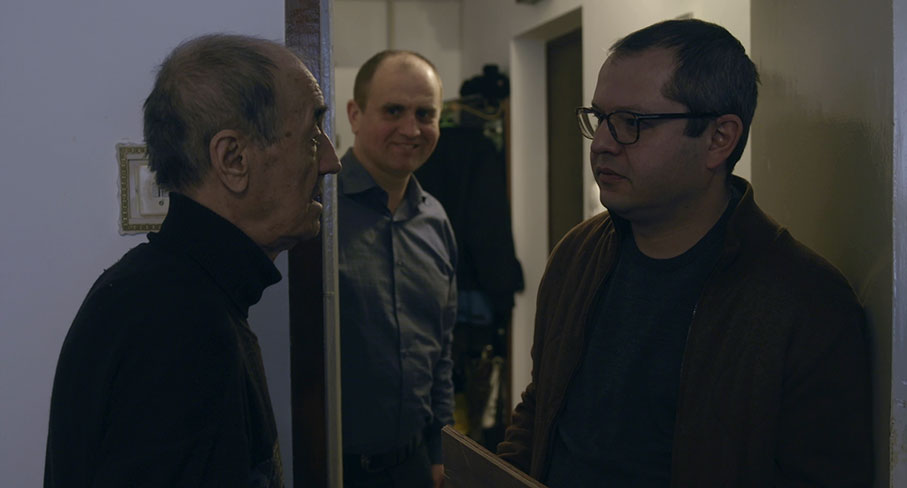
Yet sitting beneath the surface sits an intriguing metaphor for post-communist, post-Ceaușescu Romanian society, one that I initially suspected was in the eye of this beholder but that director Porumboiu's past work suggests was always intended, something confirmed by his interview and post-screening Q&A on this disc. A key example is Laurentiu's unwavering conviction that the rule changes he is proposing could make it safer and easier for the players, even though it would fundamentally change the way the sport is played. As he and Porumboiu talk about creating rules that are designed to free the ball but that would put more restrictions on the players, and later a proposal to return to a system of play that was long ago abandoned, it can't help but feel like a metaphor for the societal and political change their country has undergone since following the 1989 revolution. It's a metaphor that takes an interesting turn when Laurentiu's ideas are ultimately judged by those charged with putting them into practice as unworkable, and he responds by rethinking these rules and adding new ones, to the point where I genuinely lost track of what he was proposing. At no point does he concede that he is increasingly over-complicating a game whose appeal lies in part in its simplicity, something even Porumboiu challenges him on at one stage. And this socio-political reading of the film is in no way confined to Romanian society, being also painfully reflective of our own current government, whose bumbling attempts to cope with the negative impact of a Brexit it sold us but failed to prepare for has seen it repeatedly not just redefine the rules, but attempt to rewrite the history of the whole shambolic affair.
Perhaps the most clear-cut reference to the film's sly socio-political undercurrent comes when Laurentiu's father deconstructs a painting he has hanging on his wall for the visiting Porumboiu, observing that the female revolutionary it portrays is bringing order to the chaos of nature with a rifle. The emergence of Romanian society into a new, post-revolutionary period is also alluded to in the final, audio-only conversation between the Laurentiu and Porumboiu, when Laurentiu cites Plato's Republic and its notion of humankind living in a dark cave and being slowly brought into the light. It's a process, he reminds us, that has to be done gradually, as if you leave the cave too quickly, the sudden exposure to the light will blind you. You can read what you like, meanwhile, into his insistence that the ball is the true star of any football game (a claim he backs up by pointing out that it's the ball that is followed by the camera in televised matches), which theoretically makes the players secondary to the most basic tools of their trade and effectively strips them of their status as international sports stars.
Porumboiu's fondness for long static takes is broken up a little here by the use of two cameras to offer alternative angles on a scene, or to alternate between wide shot and close-up. His willingness to let his cameras keep rolling regardless of what happens also gives rise to one of the film's most intriguing and subtext-relevant sequences, when an interview with Laurentiu in his office is interrupted by an elderly woman and her younger male friend seeking justice in a land dispute against a local business.
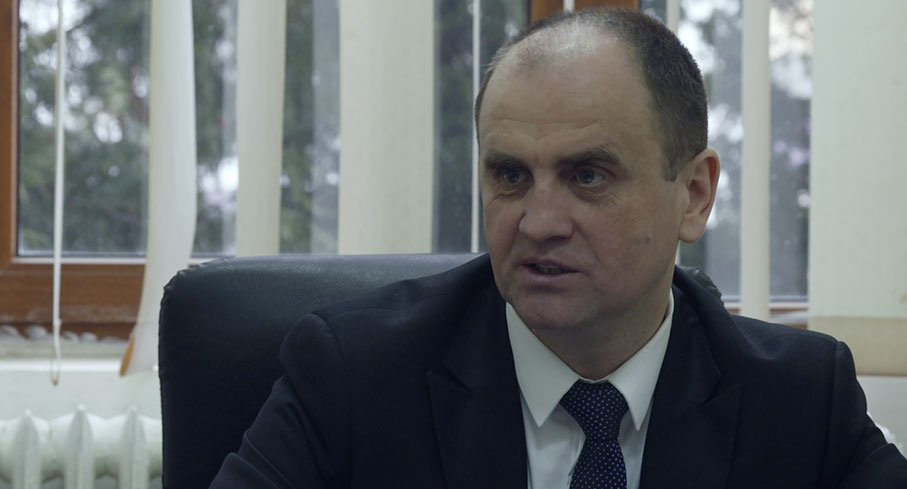
I have no doubt that for some, the film will still feel a little light on content and detail, and even I'm not going to claim it's the equal of Porumboiu's allegorical 12:08 East of Bucharestor its immediate follow-up, Police, Adjective, both of which I hold in the highest regard. But Infinite Football is still an intriguing and quietly seductive diversion, one whose penchant for imparting information through suggestion and allusion makes it more substantial in content than first impressions might suggest. It's also thematically linked to the director's previous documentary feature, the more overtly political The Second Game. Handy, then that this earlier film has also been included on this Blu-ray release.
What sounds like the title of a sequel to Infinite Football was in fact made four years earlier, but it still feels like a companion piece. Technically, it's an extra feature on this disc – it's located in the Special Features menu, after all – but as an earlier documentary feature by the same director, one that runs for 28 minutes longer than the headline film, it surely deserves to be treated as the second (or chronologically first) half of a double-bill. Structurally, it's as pared down as a film can be, and a one-line description will likely have many wondering how it qualifies as a movie at all. Try this. As a recording of 1988 football match between Romanian teams Steaua and Dinamo plays silently out on screen in its entirety, director Corneliu Porumboiu and his father Adrian comment on the match, which Adrian refereed, despite having been told that continuing to do so could prove fatal to him. Sounds exciting, doesn't it? Add to that the fact that the tape of the match is an old and sometimes blurry VHS recording and you've got a recipe for what must sound like painfully dull evening's entertainment. Yet just five minutes in, I was utterly hooked. Why? I'm glad you asked.
Despite the image quality, the game itself differs from the Match of the Day norm by being played in heavy snowfall on a pitch whose markings were all obscured by fallen snow even before it began. But it's what Adrian calmly reveals in those opening minutes that prompted me to sit up and take serious notice. This was one of many matches refereed by Adrian when Romania was under communist rule, and it turns out that the clearly talented footballers on both teams were also representative of the darker elements of the country's power base, with Dinamo made up with players from the country's Police and Secret Police, while the team's key rival, Steaua, consisted of Army personnel, and was dictator Nicolae Ceaușescu's favourite team. Adrian was a relatively unknown referee with only six First League matches under his belt when he was courted separately by both teams, each of which expected him to throw the match in their favour. This was brought to the attention of National Sports Council after Adrian reported it to the Football Federation, and it says something about the Sport's Council's standing at the time that its intervention prompted both teams to immediately back off. "I found out later," Adrian recalls, "both teams were saying, 'The referee is crazy!'" From that point on, he was left alone to do his job properly. Not all of his colleagues were so fortunate, he suggests, and if you made one mistake, they knew everything there was to know about you and would use it against you. "And then you weren't a referee," Adrian muses, "you were their slave."
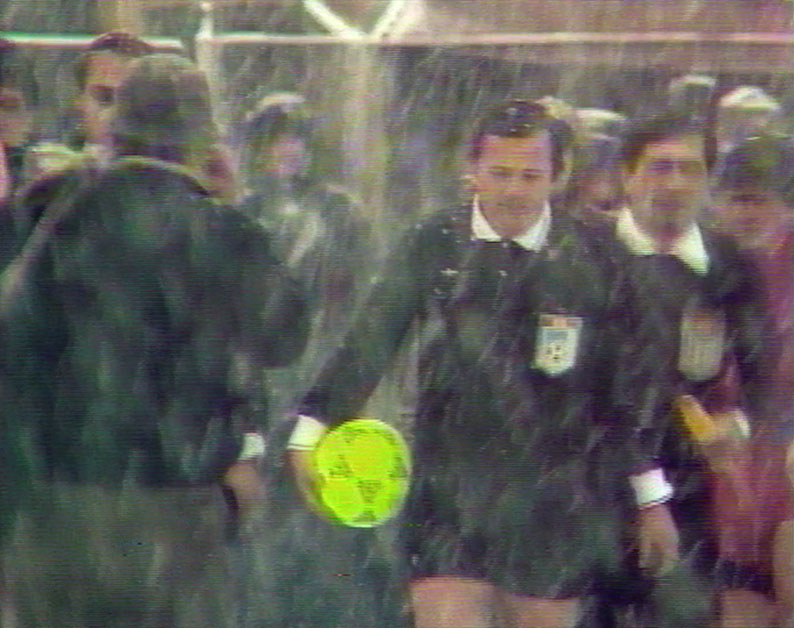
I'll admit that when I first read a brief synopsis of the film, I had assumed that the reason Adrian was supposed to quit refereeing was because he had been advised by a medical professional to do so for the sake of his health. The wording of the film's opening caption, coupled with the revelations of those first few minutes, made it clear that the warning was in fact made by someone with more sinister intentions. It was the 7 or 8-year old Corneliu who took the phone call in which this warning was delivered, with the anonymous caller advising him to convince his father to give up refereeing, "otherwise, one day he'd come home in a coffin." These were the darkest days of Ceaușescu's rule, just a year before it was brought to an end by the Romanian revolution, and the potential danger that lay in refereeing such a match between two such teams hangs over the commentary like a threatening cloud and colours many of Adrian's memories of the time. Intermittently, it moves to the fore in unexpected ways, as when on-pitch arguments threaten to break out into fights and the director of the TV coverage cuts to a wide shot of the stadium crowd to avoid screening unsportsmanlike behaviour to the viewing masses. "Look at the images these idiots are showing now," Adrian retorts when it happens during a particularly fiery exchange. A later moment of conflict even sees the director have one of the cameras point at a tree instead.
"Don't you think it looks like one of my films?" Corneliu remarks at one point in the most frequently quoted line, "It's long and nothing happens." Certainly there are more pauses later in the commentary when Adrian and Corneliu simply watch the game, and much of what Adrian says later says lacks the political impact of his early revelations. Yet even as someone with no real enthusiasm for the sport, I was never bored and even picked up a few interesting facts about the process of refereeing a football match, the specifics of which I was previously unaware of. By the end, I thus felt I knew a little more not just about the system under which men like Adrian were forced to operate during the Ceaușescu years, but also about the sport in which he so precariously worked. I was also left with considerable respect and admiration for a man who, fully aware of the potential dangers, stuck to his guns and did what was right.
Given that Infinite Football was shot with two cameras and that director Porumboiu admits in the special features that he has a considerable amount of unused footage, I'm guessing this was shot on HD rather than film, although it is framed in the standard widescreen projection ratio of 1.85:1 rather than the HD standard of 1.76:1. This suggests either that this transfer was sourced from a film print rather than an HD master, or that it was shot on film after all. Anyone know for sure? Either way, it's a clean, stable transfer with decent detail definition, and while there is an earthy hue to some of the indoor scenes and a cooler feel to the opening exterior conversation, when brighter colours do appear – notably on the kit in the indoor football match – they are naturalistically rendered. There is a slightly dour feel to some of the imagery, the result, I suspect, of a combination of shooting in gloomy weather and natural light, although post-production grading must have also have played a part here. For what it is, a solid job.
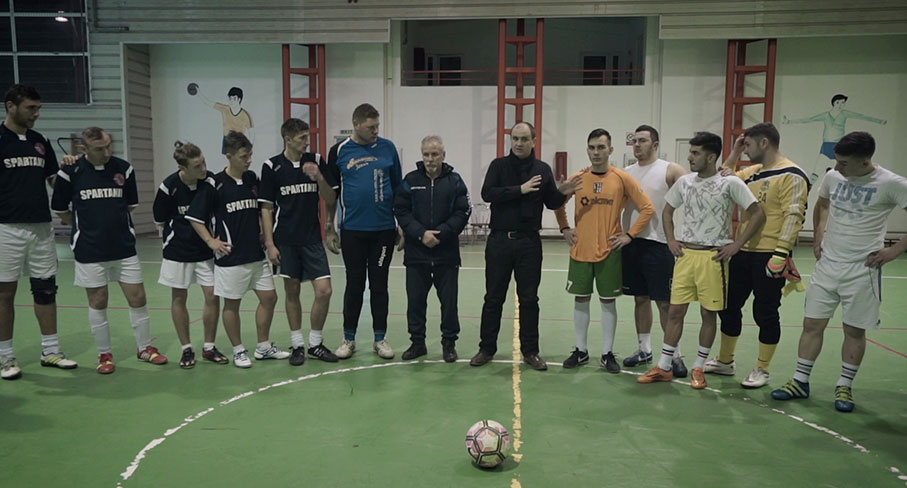
There's nothing much I can say about the image quality on The Second Game that I didn't infer in the above review. It's a fuzzy VHS recording, probably recorded off-air, framed 4:3 and with some blurring on movement. Oddly enough, for this film, that's fine.
Both films have Linear PCM 2.0 soundtracks, and while I suspect that The Second Game is mono, Infinite Football does have a stereo track, one you'll likely only detect as such during the colourful final animated sequence, where the music displays some clear frontal separation. Crucially, the dialogue is always clear, although you'll need to have a command of the Romanian language to really take advantage of this.
Optional English subtitles kick on by default on both films, but can be switched off if you have the requisite language skills.
Questions and Interruptions: Interview with Director Corneliu Porumboiu (24:33)
An interview with Corneliu Porumboiu, conducted in English at the 2019 Romanian Film Festival at the Soho Curzon in London by this disc's technical producer, Andy Starke. It's one whose title acknowledges the two-way nature of the exchange, which sometimes sees the offscreen Starke saying more than Porumboui on a topic and occasionally interjecting midway through his response to a question. It's still a welcome and enlightening conversation in which Porumboiu tells us a little more about Laurentiu and why he decided to make a film about him, his own relationship to the sport of football, the end-of-film animated sequence and music, and his views on Laurentiu's proposed rule changes and what they mean to the man who devised and is still revising them.
Q&A Session with Director Corneliu Proboiu (30:05)
A post-screening Q&A with director Corneliu Porumboiu, recorded in the Curzon Soho from a few rows back in a single wide shot but with very clear sound, in which Porumboiu answers questions from two unnamed hosts and several unseen audience members, who are thankfully handed a microphone before speaking and are thus also clearly audible. Although there is inevitably some crossover with the above interview, there's more than enough that is unique to this feature to justify its inclusion. Subjects covered include Laurentiu's desire to change the rules and its potential impact on the game, the symbolic nature of his injury when applied to post-communist Romanian society, the closing animation and music, the in-film photograph of Porumboiu's wedding given to him by Laurentiu's father, Laurentiu's reaction to the finished film, and more. Of particular note is the audience member who plays cage football and supports Laurentiu's proposal to round the corners of the pitch, which he believes would be a genuine improvement. I take it all back.
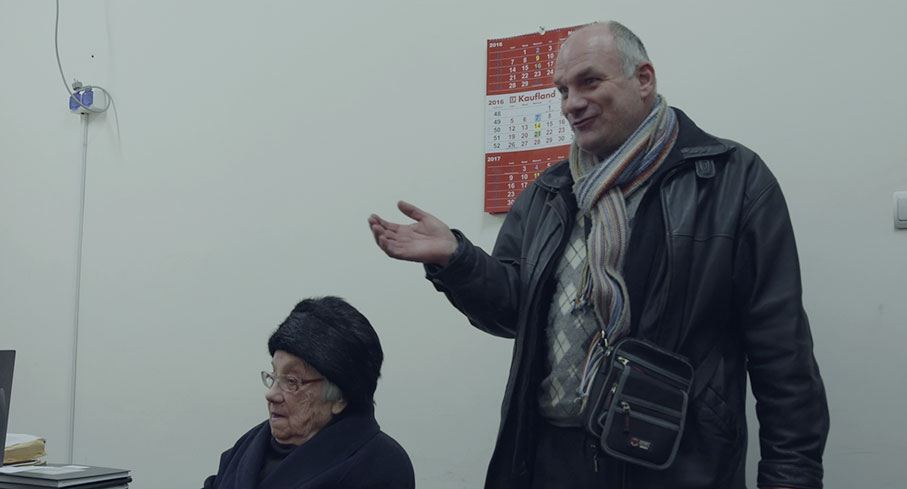
Theatrical Trailer (1:35)
Not an easy sell, I'd have thought, but this Anti-Worlds badged trailer is rather seductively assembled, certainly enough to pique my interest had I not yet seen the film.
Also included is a 24-page Booklet, which although beefed up a bit with some double-page stills, is nicely designed and features a thoughtful essay on both films and on the origins of the rules of football as a game by Kaleem Aftab. He also handily reminds us that even European football authority UEFA has been known to occasionally change the rules of the game. This is followed by a shorter but equally persuasive piece by producer of this very disc, Evrim Ersoy, on Porumboiu's talent for infusing the politics of his films with humour and how this applies to the two films in this set. Rounding things off is a director's statement and brief biographies of Porumboiu and Laurentiu.
I'm not going to pretend that I can't understand why anyone would dislike Infinite Football because I can. It breaks with established documentary format and for some will feel lightweight and incomplete, like an extended sequence from a more detailed study of the game or the man. Yet even before the political undercurrents started to register, I found myself oddly entranced by Porumboiu's unhurried approach and Laurentiu's backstory, and once they start discussing the impact of the rules on the players and the spectators, the subtext becomes clearer, in part because much of it is not specific to Romanian society. The Second Game, meanwhile, pares the documentary format down to its fundamental basics, but still proves a compelling watch for what it tells us about pre-revolutionary Romanian society, and even the game of football itself. To have both films on a single release would be good enough to recommend this disc, but it also includes an interview with Porumboiu, a post-screening Q&A, and a quality booklet. Absolutely not for everyone, but for those who are game (no pun intended), a very fine release.
|